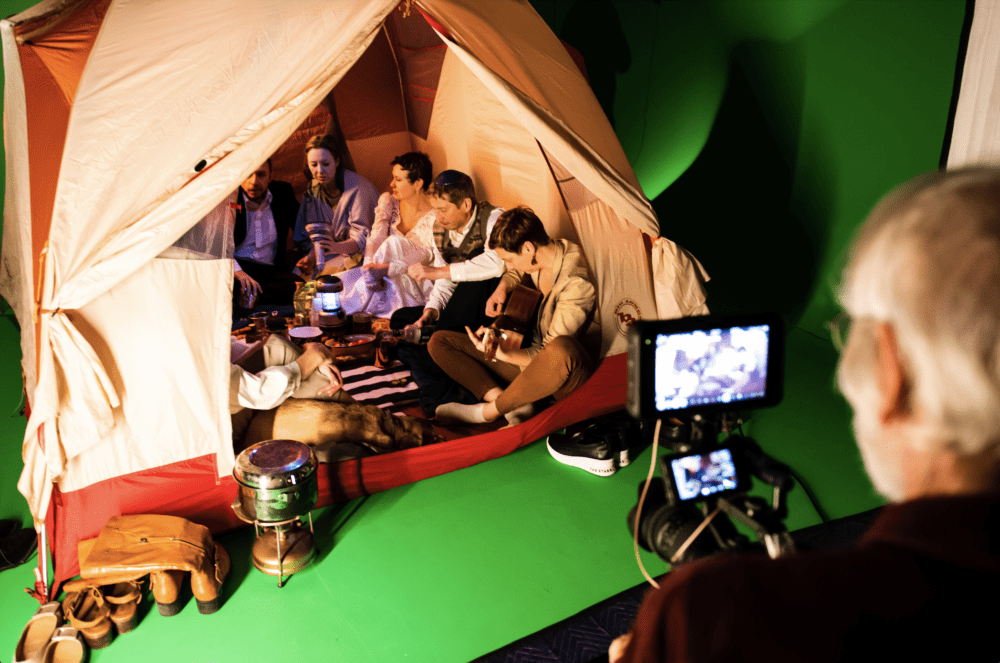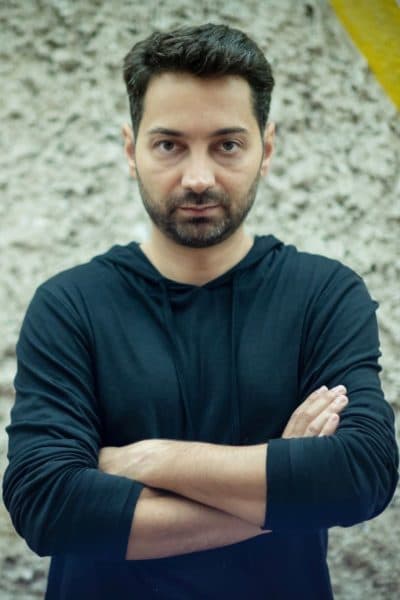Advertisement
The war in Ukraine is personal for Needham’s Arlekin Players Theatre

The members of Arlekin Players Theatre operate out of a modest black box in Needham. The utilitarian space, cluttered with camera equipment and props from bygone productions, is where the company performed for live audiences before the pandemic, and where it films its innovative virtual productions now.
It's a theater not unlike one in Kyiv where people recently took shelter from the Russian invasion, says Arlekin artistic director Igor Golyak.
"People, not in beds, just with sleeping bags on the floor," says Golyak, who received photos of the Kyiv theater from a friend. "And experiencing this horror, in a theater that looks very much like ours."

The images hit home for Golyak, who was born in Kyiv and lived there until he was nine. He remembers a city that was always green. Now, he says, his heart bleeds, watching the war from afar.
"I cry a lot, watching this," he says. "It's unbearable, it's unthinkable."
The war is personal for Arlekin's entire company, whose members all hail from countries in the former Soviet Union. As the Russian assault on Ukraine continues and the humanitarian crisis grows, the small theater has taken up the Ukrainian cause, with a fundraiser called Artists for Ukraine.
It began on Feb. 28, when Golyak put out a video plea on Facebook. "I'm standing in our black box theater in Needham, Massachusetts," he said, though it looked more like he was pacing. "This is where we gather, where we hope, we dream, together." He asked his fellow artists to post the donation link, along with an "artistic offering," to help spread the word. He told them about that theater in Kyiv.
"This could be us," he said. "This is us."
Golyak’s hashtags, #ArtistsforUkraine and #Artists4Ukraine, began to make the rounds. Singers, musicians and theater companies posted the donation link on social media, along with videos of themselves reciting poems and playing music. A few notable actors, including Mark Ruffalo, even shared it.
Advertisement
But the most affecting messages came from Arlekin company members themselves. One actor spoke of the small Ukrainian town where his grandfather grew up, now being shelled by Russian forces. An actress from Saint Petersburg remembered visiting Kyiv as a teenager: "It was spring. Kyiv was gorgeous. And I remember feeling free, and independent, and so grown up." Another talked about her uncle in Kyiv, a Holocaust survivor. "He survived German occupation," she said. "He might not survive now."
Many of the actors concluded their videos by reciting poems; one performed a Russian folk song with her folklore ensemble, a trio of voices rising in solemn harmony. In Kyiv, an actress took a moment to recite a poem by the Ukrainian poet Ivan Franko, before returning to the basement where she was sheltering from the bombardment. An actor from the town of Ivano-Frankivsk, in Western Ukraine, sang the Ukrainian national anthem, against a backdrop of exposed beams and cracked plaster. "It's a song of resistance," Golyak says.
The campaign received one message from a Russian artist, who wrote in anonymously, afraid to show public support because of Russia's harsh crackdown on protests. An Arlekin Players Theatre staffer read the letter aloud in a Facebook post. "Forgive me," the letter-writer said. "I am afraid, and therefore I won't be able to take part in the campaign."
Golyak says the war has caused a kind of identity crisis for Arlekin Players Theatre. Some members of the company grew up in Russia, and many have relatives in both countries. Even speaking Russian — a primary language for many — is fraught.
"You always have a sense, 'Wow, this is a this is an aggressor's language, but this is also part of me. So how do I cut that out of me? How do I not speak it?'," Golyak says. "And how do you live with yourself?"
The support for the fundraiser has been gratifying. The theater has nearly reached its goal of raising $20,000 for Nova Ukraine, an American nonprofit helping provide humanitarian aid in Ukraine.
But for Golyak, watching the war unfold from a distance is agony. He longs to return to Ukraine, to lend a hand in some practical way. But he has a three-year-old child to think about. And there are limits, he says, to what an artist can do in times in crisis.
"I can empathize," Golyak says. "I can create warmth. I can connect people. I can help heal emotionally. But I'm not a surgeon. I can't actually close the wound."
The war makes Golyak think of Arlekin's most recent show, "Witness." The play is based on a real historical event, in which an ocean liner carrying more than 900 Jewish refugees seeking asylum from Nazi persecution were turned away from Cuba and the United States. The ship was forced to return to Europe, and nearly a third of the passengers died in the Holocaust.
"All this was almost like a way for Hitler to test, what would the world do?" Golyak says. "Putin is just like that, testing the world, 'What what would they do?'"
He sighs. "I don't want to do a play about this. I really don't."
The fundraiser by Arlekin Players Theatre runs until Wed. March 16.
This article was originally published on March 14, 2022.
This segment aired on March 14, 2022.
